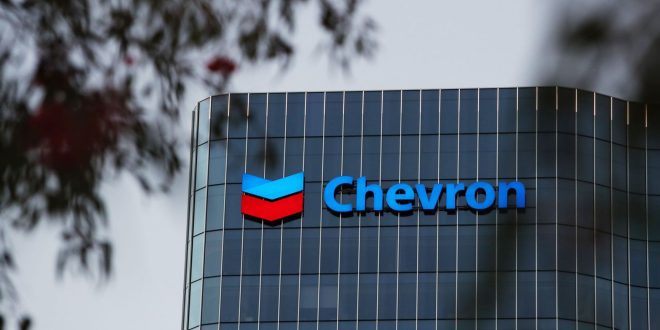شركة شيفرون الأميركية تركز على الاستثمار في بحر لبنان
تعد شركة شيفرون الأميركية واحدة من أكبر شركات النفط والغاز على مستوى العالم، ولها تاريخ طويل في منطقة الشرق الأوسط، مما يجعلها شريكًا استراتيجيًا في مشاريع الطاقة. ومع تزايد التوترات السياسية والاقتصادية في لبنان، تبرز تساؤلات حول إمكانية دخول شركة شيفرون إلى السوق اللبناني، خاصة بعد تعليق شركة توتال الفرنسية لأنشطتها في عمليات التنقيب عن الغاز بسبب تدهور الأوضاع السياسية والأمنية في لبنان والمنطقة.
شيفرون: تاريخ طويل في الشرق الأوسط
تأسست شركة شيفرون في عام 1979، ومنذ ذلك الحين وسعت نطاق عملياتها لتشمل العديد من دول الشرق الأوسط مثل السعودية، حيث تشارك بشكل كبير في مشاريع البترول وعمليات التنقيب والإنتاج. بالإضافة إلى ذلك، تعمل الشركة في العراق من خلال تطوير حقول النفط في إقليم كردستان، وفي قطر عبر مشاركتها في مشاريع الغاز الطبيعي المسال. تُعد هذه الأنشطة جزءًا من استراتيجية شيفرون الهادفة إلى تأمين مصادر الطاقة في منطقة غنية بالموارد مثل الشرق الأوسط.
لبنان: وجهة واعدة لشركات النفط العالمية
يمتلك لبنان ثروة هائلة من الغاز الطبيعي وفقًا للدراسات والإحصائيات التي أجرتها العديد من الشركات العالمية مثل هيئة المسح الجيولوجي الأميركية، مما يجعله منطقة جذب رئيسية لشركات النفط العالمية. لكن مع الأوضاع السياسية الحالية، تثار تساؤلات حول دخول شيفرون إلى السوق اللبناني كبديل عن شركة توتال التي علّقت نشاطاتها في لبنان نتيجة لعدم الاستقرار السياسي.
فرصة لشيفرون: بديل محتمل عن توتال
من خلال الظروف الحالية والتغيرات الجيوسياسية في منطقة الشرق الأوسط، ليس هناك ما يمنع من إتمام تسوية سياسية تسمح بدخول شيفرون إلى السوق اللبناني، خاصة مع تصاعد دور الولايات المتحدة الأميركية في محاولة تحقيق الاستقرار الأمني في المنطقة بعد التوترات الأخيرة. قد يُشكل دخول شيفرون إلى لبنان بديلاً عن توتال فرصة استثمارية لأسباب سياسية عدة، بما في ذلك دورها البارز في المنطقة وقدرتها المالية الكبيرة على تحمل المخاطر المرتبطة بالاستثمار في بيئة غير مستقرة.
القدرة المالية لشيفرون واستدامة الطاقة
تتمتع شركة شيفرون بقدرة مالية هائلة، ما يجعلها قادرة على الاستثمار في بيئات محفوفة بالمخاطر مثل لبنان. كما تركز الشركة على الاستدامة في مشروعاتها للطاقة، وهو ما يضمن أن يكون تطوير قطاع الطاقة في لبنان مسؤولًا وصديقًا للبيئة. تعتبر شيفرون شريكًا مثاليًا للبنان في سياق تطوير قطاع الطاقة بشكل مستدام.
العرض الأول لشيفرون في لبنان
قدمت شركة شيفرون في عام 2017 عرضًا للتنقيب عن الغاز في المياه اللبنانية، ولكن هذا العرض لم يرتقِ إلى مستوى الجدية المطلوبة نظرًا للظروف الجيوسياسية التي كانت سائدة في ذلك الوقت. هذا ما أتاح لشركة توتال الفرنسية الدخول في السوق اللبناني بدلاً من شيفرون، لكن مع انسحاب شركة نوفاتك الروسية بسبب القيود المفروضة عليها في ظل الحرب مع أوكرانيا، عادت الأعين تتوجه إلى شيفرون كبديل محتمل.
الاستقرار الأمني والسياسي: عامل حاسم في نجاح الأنشطة البترولية
تعتبر شركة شيفرون الأميركية لاعبًا محتملاً في تطوير ثروة الغاز في لبنان، خاصة مع التغيرات السياسية الأخيرة التي شهدتها المنطقة. ولكن يبقى الاستقرار السياسي والأمني في لبنان والمنطقة هو العامل الرئيسي الذي سيحدد نجاح أو فشل أي نشاط بترولي في البحر اللبناني.
Chevron Eyes Investment in Lebanon's Waters
Chevron, one of the largest oil and gas companies in the world, has a long history of operations in the Middle East, positioning itself as a strategic partner in energy projects. Amid political and economic tensions in Lebanon, questions arise about Chevron's potential entry into the Lebanese market as a substitute for the French company Total, which suspended its gas exploration activities due to the deteriorating political and security conditions in Lebanon and its surroundings.
Chevron’s Long History in the Middle East
Founded in 1979, Chevron has expanded its operations to include many countries in the Middle East, such as Saudi Arabia, where it plays a significant role in petroleum projects and exploration activities. Additionally, the company operates in Iraq, focusing on the development of oil fields in the Kurdistan region, and in Qatar through its involvement in liquefied natural gas (LNG) projects. These activities are part of Chevron's strategy to secure energy resources in the resource-rich Middle East region.
Lebanon: A Promising Destination for Global Oil Companies
Lebanon is home to vast natural gas reserves, according to studies conducted by organizations like the U.S. Geological Survey and other global firms, making it an attractive destination for international oil companies. However, given the current political situation, questions have arisen regarding Chevron’s potential entry into the Lebanese market as a replacement for Total, which halted its operations due to political instability.
A Potential Opportunity for Chevron: A Viable Alternative to Total
With the current geopolitical changes in the Middle East, there’s nothing preventing a political settlement that allows Chevron to enter the Lebanese market. This is especially relevant with the increased role of the United States in striving for regional security and stability after the recent tensions. Chevron’s entry into Lebanon could be an alternative to Total for various political reasons, given its prominent role in the region and its financial capacity to absorb risks in unstable environments.
Chevron’s Financial Strength and Energy Sustainability
Chevron’s substantial financial capabilities make it well-positioned to invest in high-risk environments such as Lebanon. Moreover, the company emphasizes sustainability in its energy projects, which ensures that energy development in Lebanon would be responsible and environmentally friendly. Chevron is an ideal partner for Lebanon in the context of sustainable energy sector development.
Chevron’s First Offer in Lebanon
In 2017, Chevron submitted an offer to explore gas reserves in Lebanese waters, but the proposal did not reach the necessary seriousness due to the geopolitical circumstances at the time. This allowed Total to step in, along with the Russian company Novatek, which later withdrew due to financial restrictions imposed after the Ukraine conflict. Now, Chevron is once again seen as a potential player.
Political and Security Stability: Key Factors for Petroleum Activities’ Success
Chevron is a potential player in developing Lebanon’s gas wealth, especially given the recent political shifts in the region. However, political and security stability in Lebanon and the surrounding region remains the most important factor determining the success or failure of any petroleum activities in Lebanese waters.
Translate by economyscopes team
المصدر: النهار
 سكوبات عالمية إقتصادية – EconomyScopes إجعل موقعنا خيارك ومصدرك الأنسب للأخبار الإقتصادية المحلية والعربية والعالمية على أنواعها بالإضافة الى نشر مجموعة لا بأس بها من فرص العمل في لبنان والشرق الأوسط والعالم
سكوبات عالمية إقتصادية – EconomyScopes إجعل موقعنا خيارك ومصدرك الأنسب للأخبار الإقتصادية المحلية والعربية والعالمية على أنواعها بالإضافة الى نشر مجموعة لا بأس بها من فرص العمل في لبنان والشرق الأوسط والعالم




